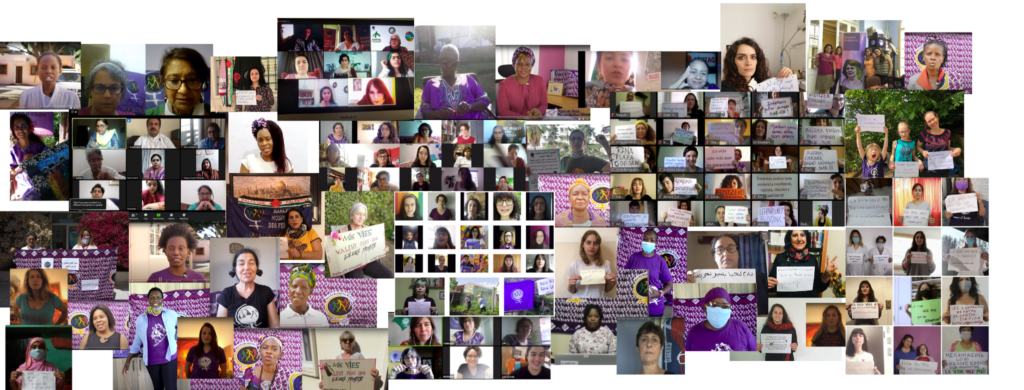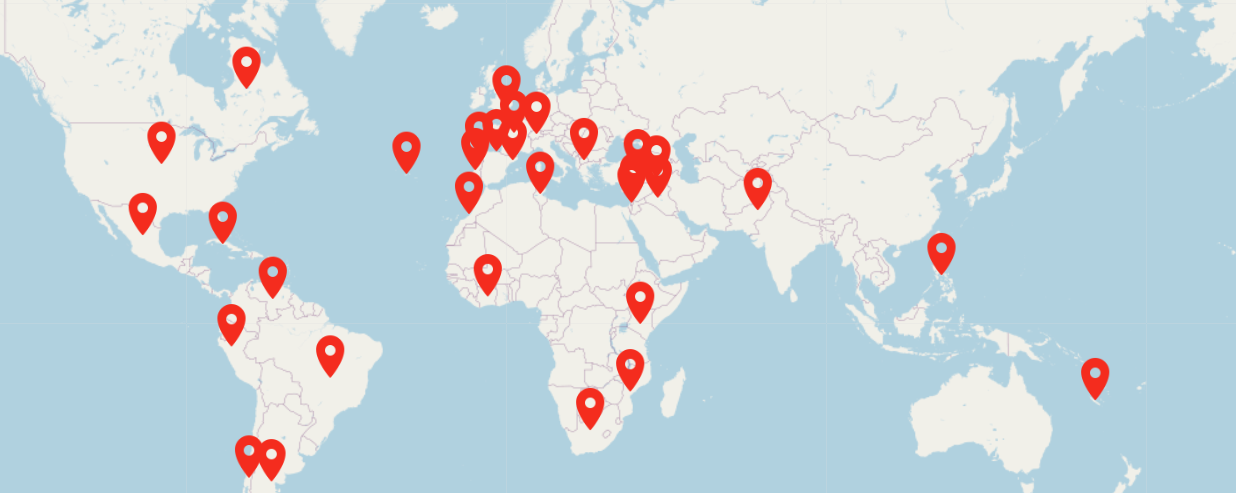
El 24 de abril fue un día de lucha en nuestra 5a acción internacional. Las mujeres de la MMM de 32 países y territorios se movilizaron en 24h de Solidaridad Contra el Poder y la Impunidad de las Corporaciones Transnacionales. Todas las actividades realizadas están en este mapa — hay enlaces a debates, publicaciones, acciones, informes de seminarios web. La denuncia y la confrontación a las transnacionales sigue como un tema del cierre de la 5a acción internacional, el 17 de octubre.
Al discutir las actividades de las corporaciones y sus impactos en la vida de las mujeres, vemos que el saqueo de los recursos y la explotación de las trabajadoras, la destrucción de los derechos y de la naturaleza, la influencia del poder corporativo en los gobiernos es constante en todo el mundo. Y que nuestro movimiento internacional nos da la fuerza para combatirlo. Tomemos el ejemplo de las empresas mineras. En nuestras 24h de Solidaridad Feminista, en 24 abril, la MMM de Turquía realizó un webinar con oradoras invitadas de la primera línea de las luchas contra las empresas transnacionales de diferentes regiones del país. En el webinar, hablaron sobre cómo el funcionamiento de las empresas transnacionales en un país tiene impacto en otros territorios. Se presentó una ponencia sobre las violaciones cometidas por las empresas transnacionales que explotan las minas de oro en las montañas de Kaz, en Turquía.
A finales de los años 90 y principios del 2000 se invitó a las empresas transnacionales a explotar esas minas y se les ofreció todos los recursos e información del gobierno y las licencias de búsqueda de minas se vendieron a muy bajo precio. Tres grandes empresas en la minería de oro son Alamos Gold, Cominco y Eldorado Gold. Establecen empresas con nombre y socios turcos, para aparecer como empresas locales, pero en realidad son transnacionales con capital 100% extranjero. Alamos Gold, una compañía canadiense, opera con dos nombres turcos en Turquía. La deforestación, los inmensos pozos vacíos, la crisis climática, la contaminación de la naturaleza dieron lugar a una reacción masiva de la gente y diferentes formas de manifestaciones el año pasado. Todos los sábados la gente local continúa su protesta. Durante la pandemia, utilizan los medios de comunicación social. La resistencia continúa durante 275 días, a pesar de las muchas formas de opresión.
Las compañeras de Quebec se unieron a la cadena de solidaridad, en las 24h de Solidaridad Feminista, para denunciar el papel de las empresas transnacionales, especialmente las mineras canadienses como Alamos Gold, con un video sobre la minería. Tres cuartas partes de las empresas mineras del mundo tienen su sede en el Canadá y operan megaproyectos en más de 100 países, sin respetar las fronteras, los derechos y el medio ambiente. El video habla de la resistencia de las mujeres y las comunidades a la extracción y su lucha por la justicia ambiental y social, en defensa de la vida y los territorios, en solidaridad internacionalista.
Lo mismo ocurre con la industria textil. En su webinar, las hermanas de Turquía recordaron que la industria textil y de la confección en Bangladesh, en la que el 90% de los empleados son mujeres, es resultado del cambio climático: tras una serie de desastres, inundaciones e hambre, los gobiernos occidentales decidieron establecer una industria en ese país, en lugar de proporcionar ayuda humanitaria. Las mujeres de Turquía utilizaron ese ejemplo para reflexionar sobre el impacto de las transnacionales en la vida de muchos territorios debido a las estrategias de ubicación de las producciones donde los costos — a costa de los derechos de las trabajadoras — son menores.
La pandemia mostró otro aspecto de estas estrategias «dirigidas por el mercado». En 2020 en Bangladesh, siete años después del derrumbe de la Plaza Rana, las trabajadoras de la industria textil están realizando manifestaciones ante los despidos y el impago de los salarios porque los pedidos de ropa se han derrumbado. Una vez más, el costo cae sobre las espaldas de las trabajadoras.
Nuestras compañeras en Pakistán describen la difícil situación de las mujeres recolectoras de algodón, que trabajan bajo un clima duro, con salarios mínimos, exponiéndose a diferentes pesticidas normalmente rociados sobre el algodón por los agricultores. Varias transnacionales, entre ellas IKEA, son las compradoras de la materia prima de algodón del Pakistán, pero rara vez cumplen con su debida responsabilidad social empresarial en este sentido. Las mujeres exigen la rendición de cuentas de todos los explotadores a lo largo de la cadena de suministro de algodón, desde los contratistas locales hasta los fabricantes del producto final.
Otro ejemplo es la industria alimentaria. En Kabirwala, Pakistán, la fábrica de leche de Nestlé, además de explotar los recursos naturales sin respetar las leyes laborales de aquel país y de haber despedido trabajadores cuando llegó la pandemia, ahora está chantajeando a las campesinas al negarse a comprar su leche. Las campesinas, preocupadas, no tienen otra opción que vender la leche al precio más bajo, ofrecido por Nestlé.
En otro continente, la Marcha en Euzkal Herria ha reportado «la feminización de la precariedad en los grandes almacenes y en la industria textil en general, que condenan a las mujeres a trabajar en pésimas condiciones de trabajo. Además llamamos a tomar conciencia sobre el modelo productivo de las grandes marcas de ropa, que abaratan sus precios a costa de la calidad de vida de millones de mujeres».
También hablaron de dos empresas transnacionales vascas, el banco BBVA y la compañía de energía IBERDROLA, «que ejercen su poder económico, social, político y jurídico y evaden impuestos, despojan territorios, precarizan la vida de las personas, financian empresas de armas, además de estar involucrados en casos de corrupción. Estas formas de actuación están respaldadas por una arquitectura jurídica que les permiten actuar con total impunidad.»
En su reunión del Día de la Liberación de África, nuestras hermanas de África contaron cómo el cierre de minas e industrias en Sudáfrica, los despidos y el regreso de los trabajadores a sus hogares desde países vecinos hicieron que la violencia doméstica creciera durante la pandemia en Mozambique o en los centros de cuarentena en Zimbabwe. En abril, las compañeras de Macronorte Perú informaron que las empresas suspendieron los contratos de las trabajadoras y trabajadores durante tres meses, sin paga. En Brasil, el gobierno genocida de Jair Bolsonaro propone proyectos de ley para hacer el trabajo aún más precario, permitiendo que las trabajadoras y trabajadores sean despedidos y recontratados por salarios más bajos — hay más trabajadores sin empleo en el país ahora mismo que empleados.
Las empresas transnacionales acumulan hoy en día más recursos que muchos países. El poder corporativo tiene muchos instrumentos para poner a los Estados y sus recursos al servicio de las ganancias y no de la vida de las personas, como los tratados de comercio y de «inversiones» y los programas de «ayuda» que endeudan a los Estados y condicionan sus políticas.» Resistimos a la financiarización y precarización de la vida, apostando en fortalecer la economía real. Marchamos para transformar las formas de organización de los trabajos que producen el vivir, con igualdad, derechos y dignidad», decimos el llamado a la 5a. Acción Internacional. Por eso luchamos. Por eso enfrentamos al poder corporativo y a los gobiernos que no defienden los intereses del pueblo, sino de las empresas transnacionales.
¡Resistimos para vivir, marchamos para transformar!
Boletín de Enlace – Julio 2020

